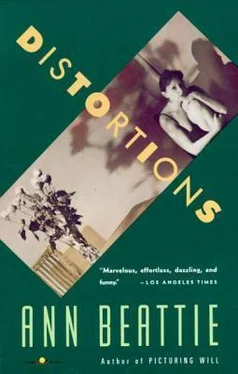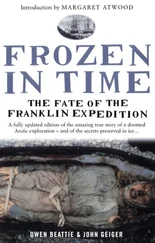Ann Beattie - Distortions
Здесь есть возможность читать онлайн «Ann Beattie - Distortions» весь текст электронной книги совершенно бесплатно (целиком полную версию без сокращений). В некоторых случаях можно слушать аудио, скачать через торрент в формате fb2 и присутствует краткое содержание. Год выпуска: 1991, Издательство: Vintage, Жанр: Современная проза, на английском языке. Описание произведения, (предисловие) а так же отзывы посетителей доступны на портале библиотеки ЛибКат.
- Название:Distortions
- Автор:
- Издательство:Vintage
- Жанр:
- Год:1991
- ISBN:нет данных
- Рейтинг книги:5 / 5. Голосов: 1
-
Избранное:Добавить в избранное
- Отзывы:
-
Ваша оценка:
- 100
- 1
- 2
- 3
- 4
- 5
Distortions: краткое содержание, описание и аннотация
Предлагаем к чтению аннотацию, описание, краткое содержание или предисловие (зависит от того, что написал сам автор книги «Distortions»). Если вы не нашли необходимую информацию о книге — напишите в комментариях, мы постараемся отыскать её.
Distortions — читать онлайн бесплатно полную книгу (весь текст) целиком
Ниже представлен текст книги, разбитый по страницам. Система сохранения места последней прочитанной страницы, позволяет с удобством читать онлайн бесплатно книгу «Distortions», без необходимости каждый раз заново искать на чём Вы остановились. Поставьте закладку, и сможете в любой момент перейти на страницу, на которой закончили чтение.
Интервал:
Закладка:
Beth said that they would have to feed the birds. Feed the birds? He lived in suburbia. In the grocery stores there were little bells of suet and birdseed that women brought home and hung in trees. Beth didn’t have one of those; she wanted him to tear up bread, put it in a pan, take it to the birds. He told her that he couldn’t get out the front door because the snow had drifted. She said that the birds would die. He climbed out the bathroom window. The breadcrumbs were blown out of the pie tin, mixed with the snow, disappeared. He climbed back in through the window. He wrapped a towel around his head and sat in front of the fire.
“Being born on the same day seemed a very good thing to go on,” he said.
He examined his wife. He thought the bathrobe peculiar, had no idea that she had gotten it very cheaply: marked down to seven dollars by the buyer after Beth jabbed a pen through the back of it. From forty-five dollars to twenty-five (small hole) to fifteen-fifty (large hole, two runs) to seven dollars (hole, runs, hem coming loose).
“It’s hard to imagine that somewhere in the world it’s warm today,” Beth said, forehead against the foggy window. She was chewing celery, heavily sprinkled with chili powder.
Wolf Dreams


when Cynthia was seventeen she married Ewell W. G. Peterson. The initials stood for William Gordon; his family called him William, her parents called him W.G. (letting him know that they thought his initials were pretentious), and Cynthia called him Pete, which is what his Army buddies called him. Now she had been divorced from Ewell W. G. Peterson for nine years, and what he had been called was a neutral thing to remember about him. She didn’t hate him. Except for his name, she hardly remembered him. At Christmas, he sent her a card signed “Pete,” but only for a few years after the divorce, and then they stopped. Her second husband, whom she married when she was twenty-eight, was named Lincoln Divine. They were divorced when she was twenty-nine and a half. No Christmas cards. Now she was going to marry Charlie Pinehurst. Her family hated Charlie — or perhaps just the idea of a third marriage — but what she hated was the way Charlie’s name got mixed up in her head with Pete’s and Lincoln’s. Ewell W. G. Peterson, Lincoln Divine, Charlie Pinehurst, she kept thinking, as if she needed to memorize them. In high school her English teacher had made her memorize poems that made no sense. There was no way you could remember what came next in those poems. She got Ds all through high school, and she didn’t like the job she got after she graduated, so she was happy to marry Pete when he asked her, even if it did mean leaving her friends and her family to live on an Army base. She liked it there. Her parents had told her she would never be satisfied with anything; they were surprised when it turned out that she had no complaints about living on the base. She got to know all the wives, and they had a diet club, and she lost twenty pounds, so that she got down to what she weighed when she started high school. She also worked at the local radio station, recording stories and poems — she never knew why they were recorded — and found that she didn’t mind literature if she could just read it and not have to think about it. Pete hung around with the men when he had time off; they never really saw much of each other. He accused her of losing weight so she could attract “a khaki lover.” “One’s not enough for you?” he asked. But when he was around, he didn’t want to love her; he’d work out with the barbells in the spare bedroom. Cynthia liked having two bedrooms. She liked the whole house. It was a frame row house with shutters missing downstairs, but it was larger than her parents’ house inside. When they moved in, all the Army wives said the same thing — that the bedroom wouldn’t be spare for long. But it stayed empty, except for the barbells and some kind of trapeze that Pete hung from the ceiling. It was nice living on the base, though. Sometimes she missed it.
With Lincoln, Cynthia lived in an apartment in Columbus, Ohio. “It’s a good thing you live halfway across the country,” her father wrote her, “because your mother surely does not want to see that black man, who claims his father was a Cherappy Indian.” She never met Lincoln’s parents, so she wasn’t sure herself about the Indian thing. One of Lincoln’s friends, who was always trying to be her lover, told her that Lincoln Divine wasn’t even his real name — he had made it up and got his old name legally changed when he was twenty-one. “It’s like believing in Santa Claus,” the friend told her. “There is no Lincoln Divine.”
Charlie was different from Pete and Lincoln. Neither of them paid much attention to her, but Charlie was attentive. During the years, she had regained the twenty pounds she lost when she was first married and added twenty-five more on top of that. She was going to have to get in shape before she married Charlie, even though he wanted to marry her now. “I’ll take it as is,” Charlie said. “Ready-made can be altered.” Charlie was a tailor. He wasn’t really a tailor, but his brother had a shop, and to make extra money Charlie did alterations on the weekends. Once, when they were both a little drunk, Cynthia and Charlie vowed to tell each other a dark secret. Cynthia told Charlie she had had an abortion just before she and Pete got divorced. Charlie was really shocked by that. “That’s why you got so fat, I guess,” he said. “Happens when they fix animals, too.” She didn’t know what he was talking about, and she didn’t want to ask. She’d almost forgotten it herself. Charlie’s secret was that he knew how to run a sewing machine. He thought it was “woman’s work.” She thought that was crazy; she had told him something important, and he had just said he knew how to run a sewing machine.
“We’re not going to live in any apartment,” Charlie said. “We’re going to live in a house.” And “You’re not going to have to go up and down stairs. We’re going to find a split-level.” And “It’s not going to be any neighborhood that’s getting worse. Our neighborhood is going to be getting better.” And “You don’t have to lose weight. Why don’t you marry me now, and we can get a house and start a life together?”
But she wouldn’t do it. She was going to lose twenty pounds and save enough money to buy a pretty wedding dress. She had already started using more makeup and letting her hair grow, as the beauty-parlor operator had suggested, so that she could have curls that fell to her shoulders on her wedding day. She’d been reading brides’ magazines, and long curls were what she thought was pretty. Charlie hated the magazines. He thought the magazines had told her to lose twenty pounds — that the magazines were responsible for keeping him waiting.
She had nightmares. A recurring nightmare was one in which she stood at the altar with Charlie, wearing a beautiful long dress, but the dress wasn’t quite long enough, and everyone could see that she was standing on a scale. What did the scale say? She would wake up peering into the dark and get out of bed and go to the kitchen.
This night, as she dipped potato chips into cheddar-cheese dip, she reread a letter from her mother: “You are not a bad girl, and so I do not know why you would get married three times. Your father does not count that black man as a marriage, but I have got to, and so it is three. That’s too many marriages, Cynthia. You are a good girl and know enough now to come home and settle down with your family. We are willing to look out for you, even your dad, and warn you not to make another dreadful mistake.” There was no greeting, no signature. The letter had probably been dashed off by her mother when she, too, had insomnia. Cynthia would have to answer the note, but she didn’t think her mother would be convinced by anything she could say. If she thought her parents would be convinced she was making the right decision by seeing Charlie, she would have asked him to meet her parents. But her parents liked people who had a lot to say, or who could make them laugh (“break the monotony,” her father called it), and Charlie didn’t have a lot to say. Charlie was a very serious person. He was also forty years old, and he had never been married. Her parents would want to know why that was. You couldn’t please them: they hated people who were divorced and they were suspicious of single people. So she had never suggested to Charlie that he meet her parents. Finally, he suggested it himself. Cynthia thought up excuses, but Charlie saw through them. He thought it was all because he had confessed to her that he sewed. She was ashamed of him — that was the real reason she was putting off the wedding, and why she wouldn’t introduce him to her parents. “No,” she said. “No, Charlie. No, no, no.” And because she had said it so many times, she was convinced. “Then set a date for the wedding,” he told her. “You’ve got to say when.” She promised to do that the next time she saw him, but she couldn’t think right, and that was because of the notes that her mother wrote her, and because she couldn’t get any sleep, and because she got depressed by taking off weight and gaining it right back by eating at night.
Читать дальшеИнтервал:
Закладка:
Похожие книги на «Distortions»
Представляем Вашему вниманию похожие книги на «Distortions» списком для выбора. Мы отобрали схожую по названию и смыслу литературу в надежде предоставить читателям больше вариантов отыскать новые, интересные, ещё непрочитанные произведения.
Обсуждение, отзывы о книге «Distortions» и просто собственные мнения читателей. Оставьте ваши комментарии, напишите, что Вы думаете о произведении, его смысле или главных героях. Укажите что конкретно понравилось, а что нет, и почему Вы так считаете.












